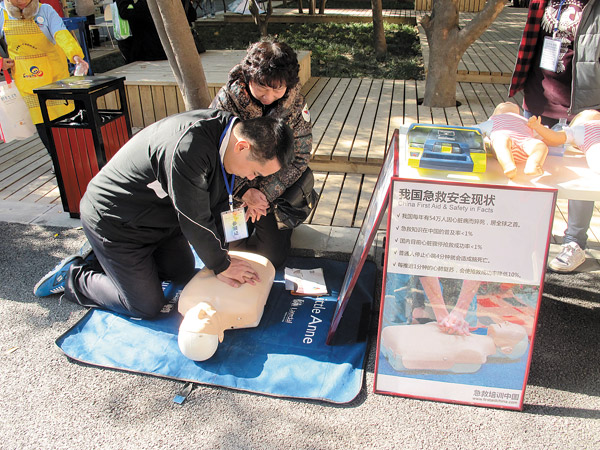Gathering NGOs into same area allows mutual support, collaboration and exchange of information
A newly opened office park in Shanghai for NGOs and social enterprises is designed to improve the city's social welfare services while boosting the public's enthusiasm for charitable giving.
 |
|
Representatives of Sinoaid Shanghai Healthcare Group demonstrate first aid & safety procedures during an event in Shanghai's New Charity World. PHOTOS provided to China Daily |
Covering an area of 23,000 square meters, Gongyi Xin-tiandi, or New Charity World, is expected to become a focal point for innovative charitable projects, according to Chen Jie, communication manager for Non-Profit Incubator, an NGO whose mission is to provide critical support for newly established NGOs and social enterprises.
It initiated the project together with the Shanghai Civil Affairs Bureau.
The park's location, No 105 West Puyu road, is tied to philanthropy. In the 1920s it was the largest asylum for orphans, the disabled and underprivisleged people in East Asia.
Later, in the 1950s, it was transformed into the Shanghai Children Welfare Center, which shelters disabled and homeless children.
Some 50 million yuan ($8.2 million) was invested by the municipal government to transform the place into a park with a combination of classical two-story architecture and high buildings, all with modern equipment, according to NPI.
"It's easier to attract the public's attention — and to gather the resources we need — when a lot of NGOs and social enterprises gather in one place," Chen said.
So far, 25 NGOs and social enterprises have set their headquarters at the park, accounting for about one third of the social organizations the park is capable of housing.
Some of the better-known charities are Xingyu autistic children's rehabilitation center; Zhiliao Public Welfare Culture Communication Center, which helps the disabled to find job opportunities; and Habitat for Humanity China, whose mission is to eliminate substandard housing by building decent homes for needy families.
"The park is geared toward social organizations whose projects and services are urgently needed in China, such as environmental protection and helping the disabled," Chen said.
The Puki Coordination Agency, a social enterprise dedicated to training the hearing-impaired in graphic design skills and finding internships and job opportunities for them, moved to the park in May.
Xiao Liang, Puki's founder, said the rent for the office is about half the price of nearby commercial office buildings along the bustling Lujiabang road.
"It is better that NGOs with similar missions gather here than scatter in separate offices across the city. We can share information and resources and collaborate with each other," he said.
Xiao's vision for the future is that the park will serve as "a platform through which more people can get to know us".
I hope the park can research the needs of each NGO and introduce the resources we need," Xiao said.
The park, which has set the ambitious goal of becoming a city landmark for charity work, is about more than just providing workspaces for NGOs.
It also tries to involve the general public through exhibitions, concerts, salons and other interactive events, Chen said.
With towering trees, gardens and grassland, the park has 3,000 sq m of open space for showcasing NGO projects.
Shanghai has built 18 hubs to incubate grassroots NGOs and social enterprises.
The park's co-builder, Shanghai-based NPI, was founded in 2006. It has helped more than 150 such grassroots NGOs to start businesses in recent years.
But New Charity World is a bit different from them, Chen said. While traditional hubs function as supporting the grassroots NGOs by providing free office space, facilities, capacity-building programs and microsubsidies, the new park absorbed organizations that already had stable projects and were self-sufficient.
Chen Xiaojing, a project manager from the NGO counseling organization I Join, said that after these grassroots NGOs took the first step — deciding to change from "a group of passionate volunteers" to "an organization" — it was important to develop management structures, finance systems, project guidelines and staff training.
"There is also a lack of high-end talents who are not only professionals in the field and willing to contribute but also skilled in the group's operation and management," she said.
In recent years, the Chinese government has rolled out measures to boost the development of social organizations and better bring their roles into play, including increasing governmental funding, tax reduction and simplifying registration procedures.
The central government will invest 200 million yuan ($32.08 million) to support organizations in the conduct of social welfare services in 2014, according to a program issued by the Ministry of Civil Affairs on Nov 26.
It was the third consecutive year the central government financed the NGOs.
In Shanghai, which is home to more than 11,000 social organizations, funding by the government accounts for 15.8 percent of the income that those groups received in 2012, according to figures from the city's Civil Affairs Bureau.
Shanghai was the first city in China to build hubs that incubate grassroots NGOs and social enterprises in 2009. Cities like Beijing, Shenzhen, Chengdu and Hangzhou have followed suit.
As of 2012, Shanghai municipal government had invested nearly 180 million yuan in the hubs, according to studies of Xu Jialiang, a professor at the Center for the Third Sector at Shanghai Jiao Tong University.
"But nearly all these hubs are cooperatives between the government and social organizations, while the business model of a market economy is seldom introduced into a project," Xu said.
He suggested that companies can also play a role in operating the hubs and in the NGOs' projects, which he said would bring more efficiency to the sector.
"The input and output of the projects should be evaluated, so as to make the hubs and projects sustainable and finally run without the backing of the government," he said.
